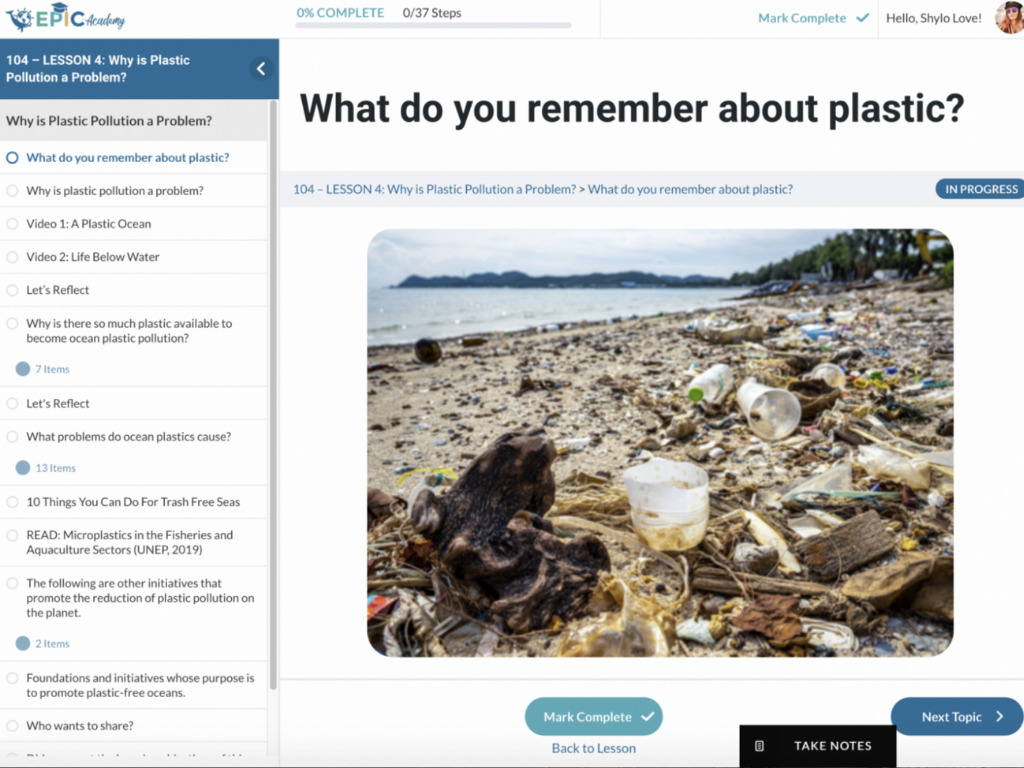Marine Plastic Waste & How You Can Help: Ocean Legacy Foundation Unveils Online Educational Platform
4 Mins Read
Recently, the non-profit organization Ocean Legacy Foundation unveiled EPIC Academy, an online free educational platform that will provide individuals and communities with important knowledge on ocean plastic pollution, the various cleanup efforts, and possible solutions for forming plastic-free environments.
Canadian-based Ocean Legacy Foundation (OLF) develops and executes plastic pollution emergency response initiatives across the world to help reduce plastic pollution. Keeping with its ongoing efforts, it has launched EPIC Academy, an online platform to educate the world about the impacts of ocean plastic on the planet and how different communities in the world are tackling this crisis.
In 2019, along with Nestlé Waters Global, OLF rebranded its existing integrated approach as EPIC, an acronym that combines Education, Policy, Infrastructure and Cleanup.
Completely free to access, the EPIC curriculum consists of around 10 lessons on ocean plastics and is open to use for individuals as well as businesses and organizations to understand how they can play an important role in plastic clean up efforts, the role of evidence-based policy to tackle this and the use of infrastructure to effectively manage plastic resources.
In a press release seen by Green Queen, president and co-founder of OLF, Chloé Dubois, said: “Communities around the world have specific environmental and emergency needs when managing ocean plastic pollution. EPIC Academy can provide essential knowledge regarding plastic pollution and solutions for communities to create plastic-free lands and oceans.”

EPIC Academy can provide essential knowledge regarding plastic pollution and solutions for communities to create plastic-free lands and oceans
Chloé Dubois, president and co-founder of OLF
Available in French, Spanish, and English, the lessons are divided into two levels – Level 1 consists of beginner lessons and is for individual learners and high school teachers to guide them on how they can educate students about this crisis with the help of classroom guides and assignments. Level 2 is more advanced and is aimed at individuals and organizations, especially local heads, and people working in waste management and recycling systems to understand how they can take action and limit the flow of plastics into the ecosystem.
All the lessons can be completed withing 90 minutes and with each the completion of each lesson, participants will earn an EPIC Academy digital badge and when Level 1 and Level 2 is completed, they will receive an EPIC Academy Certificate of Completion.
Without intervention, global ocean plastics are expected to double by 2035. If practices remain unchanged there will be more plastic than fish in the ocean, by weight, by 2050
Chloé Dubois, president and co-founder of OLF
Dubois added that during the team’s own personal experiences with plastic clean-up programs, they realized that so many people are unaware of the true consequences of ocean plastics. “During our cleanup efforts we see single-use disposable plastics, cigarette butts, derelict fishing gear, and polystyrene littered all over the coastlines. Without intervention, global ocean plastics are expected to double by 2035. If practices remain unchanged there will be more plastic than fish in the ocean, by weight, by 2050. OLF believes that every action towards eliminating ocean plastic pollution counts, and EPIC Academy is a step in that direction.”
According to studies, marine plastic has been ingested by 100% of marine turtles, 59% of whales, 36% of seals and 40% of seabird species that were examined and every year, it is linked to the deaths of over a million seabirds and 100,000 marine mammals.
In addition to this, OLF develops accessible platforms that help in restoration efforts of sensitive natural ecosystems keeping humans’ and wildlifes’ health in mind, and analyzes and creates long-term plastic collection, processing infrastructure and policy to reduce the amount of ocean plastics and negate the existing effects of it.
Given that over half of the plastic produced globally originated from Asia, the Heinrich Böll Foundation, the Break Free From Plastic movement, and the Institute for Global Environmental Strategies (IGES) together launched the new Asia edition of the Plastic Atlas that provides a regionally focused overview of the increasing plastic pollution crisis and potential solutions on how to tackle the same.
With 45 detailed infographics focussed on the region, the Plastic Atlas Asia explores the entire value chain of plastic and covers a broad range of topics revolving around the plastic pollution crisis, drawing attention to the role that plastic producers, consumers, and contributors play in the Asian economies and its impact on production, consumption, and disposal since the post-war period.
Read: John Oliver’s HBO Show Deep Dives Into Plastic Pollution & The Industry ‘Lies’ Behind Recycling
To register for the free online course, sign up here.
Lead image courtesy of Ocean Legacy Foundation.



